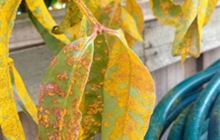Preventing the spread of kauri dieback
Archived content: This media release was accurate on the date of publication.
Introduction
We have begun upgrading tracks through our kauri forests to help prevent the spread of kauri dieback.Date: 31 May 2016
The Taheke Water Fall track in Whangarei is the first of approximately 200 tracks through DOC reserves with stands of kauri, being upgraded to help prevent kauri dieback being spread.
To protect the public and kauri in the reserve, the Taheke Scenic Reserve will be closed while contractors complete the upgrade. We are planning to reopen the reserve before spring.
Kauri dieback is caused by microscopic spores in soil that infect kauri roots, stopping the flow of nutrients to the tree. Eventually the infected tree starves death. The disease can be spread if someone walks through mud containing spores and carries the contaminated mud on their footwear to another kauri forest.
Our national kauri dieback team identified wet and muddy sections of the Taheke Water Fall where there is a risk of track users spreading kauri dieback spores in mud on their footwear.
A range of work will be done on the Taheke track to mitigate this risk. This includes installing boardwalks and geowebs to make wet and muddy sections of track dry and mud free. Geowebs are plastic, honeycomb-like cells that are installed on the track. The cells are filled with lightly compacted bark chunks and gravel then covered with surfacing grave which allow the roots to grow freely
As part of the upgrade to help prevent the spread of kauri dieback, some sections of the Taheke track will be re-routed, and steps will also be installed.
"I'm thrilled to announce that we're beginning this work to help safeguard our kauri in Northland," says Northern North Island Operations Director, Sue Reed-Thomas.
"There's no kauri dieback in the Taheke Scenic Reserve. But there are kauri with the disease nearby so we are completing this upgrade to keep the Taheke kauri safe."
"There are up to 200 tracks from Tauranga north where action is needed over the next three years to protect kauri. We'll be working closely with treaty partners, local hapu and iwi and community conservation groups for each of these tracks."
Other tracks will be temporally closed while they're upgraded. The next tracks to be upgraded this year will be in Whangarei, Bay of Islands and Auckland. The public will be informed of these temporary closures. There will be signs at the tracks and temporary closure notifications will be posted on our website.
Meanwhile, the multi-agency Kauri Dieback Management Programme continues research into the origin of the disease, its spread and new ways to detect its presence.

